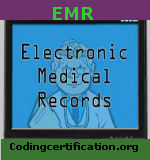The Electronic Medical Record has impacted the medical practice in a significant way. The question is, from the perspective of a medical practice manager (PPM), biller or coder; is that a good thing? The answer is, not always.
On one hand, the ease of accessing patient information does allow billers the opportunity to choose the correct diagnosis and procedure code if there is a question regarding services rendered. For example, if the physician charges a level 5 established patient E/M with a diagnosis of toe pain, a biller might want to read the documentation to see if it was more complicated to justify a level 5 visit. She may also need to see if it was an accident or injury.
If a claim is denied because one of two minor surgical procedures was denied due to a 10 day global period, a biller may have to see if it was a staged procedure or another issue.
For the medical biller, having to confirm payer information or check documentation for services on a regular basis, in order to ensure a clean claim submission, there is a problem. Valuable time is being wasted doing research that should already have been done. Incomplete data significantly impacts the flow of revenue to the office.
Time Wasters: Electronic Medical Record
An occasional look-up is one thing, but to have your practice management software screen open at the same time as your EMR menu to constantly verify information is not part of the job description of a biller. Admittedly, having access to an EMR is more resourceful compared to years ago when billers had to send erroneous charges back to the doctor for answers.
Depending on the number of encounters a biller verifies in a day can point to problems at the front desk or it could mean a coding education class is in order with the provider(s).
What exactly has happened since EMR has entered the medical practice? My first thought is decreased productivity. In the beginning, productivity was impacted due to EMR implementation and training. But now there is another reason: claims are not turning around as fast as they used to.
So what exactly is happening? We can start with the front desk and the information that is gathered from the patient. All insurance cards should be scanned into the EMR. The date of the scanned card should be evident in the medical record. Quite often billers will receive encounter forms with outdated payer information. Billers need to know exactly what the current coverage is and if the patient is eligible. More often than not, the front desk does not update the medical record until after the billing office receives the charge slip. Sometimes it’s unavoidable. The front desk can be extremely busy and is often forced into multitasking. Front Desk Tip: Have all the information updated in the medical record before the billing department receives the billing. Make sure records are locked as well.
The practice manager (PPM) can assess the number of insurance denials based on terminated coverage or perhaps the improper use of modifiers. Practice Management Software can produce reports to point out weak areas. Find out if your EMR can transfer data such as the last surgical date or date of injury onto the billing form as well. This would be one less thing a biller has to concern herself with before the billing goes out.
The point remains, that if the medical practice has a history of delivering inaccurate information, the biller will automatically go into the record and check to see if they have the most updated information. This is a time-consuming process that can be avoided. Appealing claims due to poor information is also a productivity killer.
In summary, Physician Practice Managers have an obligation to make certain that information is being delivered timely and accurately in order for the billing to transmit without delayed or denied payments. Log on to www./joannesheehan and learn about CCO’s physician practice management training, medical coding training, or obtain the modifier cheat sheet to help your doctors understand the need for reporting modifiers on their billing sheets.
Get More Related Details about Electronic Medical Record
6 Essential Medical Coding Skills
AAPC – Electronic Medical Records
![[CCO] Certification Coaching Organization LLC [CCO] Certification Coaching Organization LLC](https://www.cco.us/wp-content/uploads/2015/05/CCO-Logo-2015-d3-500px.png)
